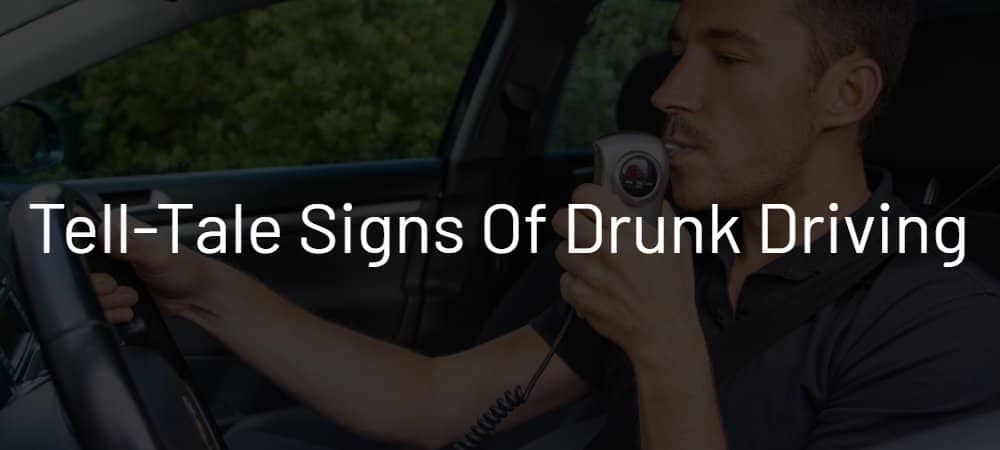Tell-Tale Signs of Drunk Driving
Click For Free Consultation
Legally Reviewed By: Robert M. Knowles
Attorney & Partner At Knowles Law Firm
It is impossible to operate a motor vehicle with the required amount of care, prudence and attention while under the influence of alcohol or drugs. Despite knowing the risks of drunk driving, thousands of drivers in Nebraska commit this dangerous crime each year. According to the Nebraska Department of Transportation, 1,534 alcohol-related accidents were reported in 2020 alone. Decrease your odds of getting into a drunk driving accident by learning the tell-tale signs of driver intoxication.

Inability to Stay in One Lane
Drinking alcohol has a physical impact on a driver. Depending on the level of intoxication, a drunk driver may have trouble seeing clearly, as well as issues with balance and equilibrium. Driving in a straight line can prove difficult or impossible for a drunk driver. This can result in the driver being unable to remain in his or her lane.
One of the most common signs of drunk driving is a motor vehicle swerving erratically, drifting in and out of a lane, making abrupt or unsafe lane changes, cutting other drivers off, veering off the road, and weaving between lanes of traffic. Being unable to stay in one lane can show that the driver is having trouble driving between the lines or focusing on the road.
Driving Too Fast or Too Slow
Drunk driving can take away a driver’s inhibitions and lead to reckless driving behaviors, such as speeding and racing. If you encounter a driver who is traveling at excessive speeds or attempting to race other drivers, he or she may be under the influence. Speeding is not the only possibility, however. A drunk driver may also drive too slowly. The driver may attempt to avoid suspicion – and getting pulled over for speeding – by traveling far below the posted speed limit. This in itself could be a sign that the driver is not thinking clearly or knows that he or she is doing something wrong.
Abrupt Braking or Acceleration
A drunk driver is often unable to fully control his or her muscles, strength and movements while under the influence of alcohol. This can result in abrupt or erratic braking and acceleration. A driver slamming on the brakes, slowing down for no reason or randomly accelerating could point to intoxication. These driver behaviors are dangerous and can cause an accident, especially on the freeway.
Tailgating
Impaired drivers often cannot judge distances clearly. This can result in a drunk driver tailgating others, or following behind other vehicles too closely. Drunk drivers may also experience anger or fits of road rage that caused them to intentionally tailgate someone to make a point – such as to tell the other driver to get out of his or her way. Either way, tailgating is a dangerous practice that can result in rear-end collisions.
Major Traffic Infractions
One of the many reasons why drunk driving is so dangerous is because alcohol impairs a driver’s ability to make sound and rational decisions. It increases recklessness and bad decision-making – often resulting in a drunk driver who violates major traffic laws. If you notice another driver running red lights and stop signs, speeding excessively, blocking traffic, driving at night without headlights, driving the wrong way, or making other serious infractions, keep your distance, as the driver is most likely under the influence.
What to Do if You Encounter a Drunk Driver
If you believe you have spotted a drunk driver, reduce your speed or take other precautions to increase the distance between you and the drunk driver’s vehicle. Do not attempt to stop the driver or get into an altercation. If the situation appears to be an emergency, call 911 to report the drunk driver. Otherwise, you can report impaired driving by dialing *55 to reach the Nebraska State Patrol Highway Helpline.
Report the driver by giving a description of the car, the license plate numbers (if possible), and the location and direction of the vehicle. If you get into an accident involving a drunk driver, contact a car accident attorney near you for legal assistance. A lawyer can help you hold an intoxicated driver liable for your collision.

About Our Attorney
Robert M. Knowles
Attorney & Partner at Knowles Law Firm
Robert has tried cases in both state and federal courts and was selected as one of the top 100 litigation lawyers in Nebraska for 2014 by the American Society of Legal Advocates. Less than 1.5 percent of lawyers nationally are selected for this recognition. He is rated AV by Martindale-Hubbell which is the highest rating an attorney can obtain. He was also selected by Martindale-Hubbell as a 2019 Top Rated Lawyer.
